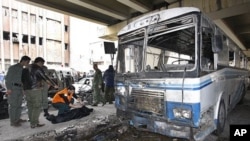Syria says an attacker blew himself at a busy intersection in the capital, Damascus Friday. At least 25 people were killed and 46 others wounded. It was the second major bombing to rock the capital in two weeks.
In the Damascus neighborhood of Midan, witnesses say the explosion took place near an intersection, as vehicles waited for a traffic light. The blast blew out windows of surrounding buildings and hurled shrapnel at motorists and passersby. State media claimed a suicide-bomber caused the explosion.
It was the second major bombing in the same area in two weeks. Two bombings took place in the nearby district of Kafr Sousa in late December near government security compounds.
State television broadcast graphic images from the scene and interviewed bystanders who said government opposition groups were behind the blast. Foreign media, however, report that opposition leaders blame the government for orchestrating the attack.
One man accused a Syrian opposition leader of responsibility for the bombing. Several others blamed the United States and Israel.
But Riyadh al Asaad, a leader of the opposition Free Syrian Army, told al-Arabiya TV that the Syrian government directed the bombing. He said the regime has a “long history of manipulating terrorist attacks.”
Asaad questioned “why the bombing took place in a middle-class neighborhood with strong support for the opposition,” rather than a “more well-to-do pro-government neighborhood in the center of Damascus.” He noted that reporters for state TV arrived at the bomb scene “before rescue crews.”
However, Hilal Khashan, who teaches political science at the American University of Beirut, thinks it is more likely that Islamic extremists were behind the bombing.
"I don't think it was the work of the government, because the suicide bomber targeted a police van," Khashan said. "And it wouldn't really make much sense for the government to bring the battle to Damascus, because it is the [nerve center] of the political system. I'm inclined to assume that it was the work of Salafists in Syria, and I put the blame for their activity on the regime, because it was the regime who used to send them to Iraq. Now the magic has turned against the magician.”
Middle East analyst Fouad Ajami said before the bombing that the Syrian regime is facing a breakdown of its once-tight grip on society, and is seeing an influx of "troublemakers" from neighboring countries.
"Guns, ideas, jihadists would flow back and forth. And remember one thing: that's what the Syrian regime itself had wrought by sending thousands of jihadists, both from within Syria and from every Arab country conceivable ... to Iraq in '04, '05, '06, '07 and '08. Now the chickens have come home to roost," Ajami said.
Meanwhile, witnesses reported that government security forces shot at protesters in the northern city of Hama Friday. Dozens of towns and cities participated in the weekly protest movement. Internet videos showed thousands of people chanting anti-government slogans on opposition websites.
| Join the conversation on our social journalism site - Middle East Voices. Follow our Middle East reports on Twitter and discuss them on our Facebook page. |




